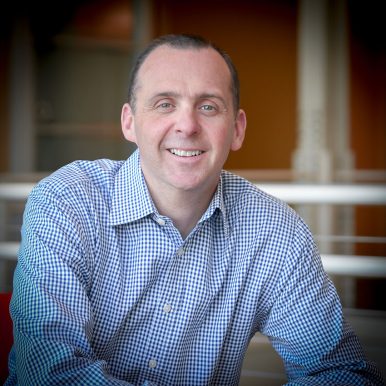Keeping their own counsel
In-house lawyers trade hustle culture for corporate stability
M.J. McAteer //August 30, 2023//

Hitt Contracting's general counsel, Sheila Sears, found the idea of joining the growing company appealing, even though she wasn't looking to leave her law firm. Photo by Shannon Ayres

Hitt Contracting's general counsel, Sheila Sears, found the idea of joining the growing company appealing, even though she wasn't looking to leave her law firm. Photo by Shannon Ayres
Keeping their own counsel
In-house lawyers trade hustle culture for corporate stability
M.J. McAteer //August 30, 2023//
Of the 1.3 million attorneys practicing in the United States — more than 35,500 of them licensed to practice in Virginia — the American Bar Association reports that more than half are based at law firms, while only about 10% serve as in-house general counsels. That disparity is not because general counsel jobs are unwanted or unattractive, however — quite the opposite. Although they come with their own set of pressures, in-house legal positions are often highly sought-after and can be hard to come by.
“In the ’80s, going in-house was considered inferior,” says Deborah Majoras, a former chairman of the Federal Trade Commission and longtime chief legal officer for Procter & Gamble until her retirement last fall. Back then, recalls, Majoras, who received her law degree from the University of Virginia, in-house counsels “mostly kept the trains running on time,” and the “sexy issues” were farmed out to law firms. That’s not as often the case these days.
Today, in-house lawyers get their fair share of interesting casework without being subjected to the pressure of racking up billable hours. And instead of being at the beck and call of a bunch of clients, they serve just one — the business itself. Their schedules are generally more stable and predictable than those of their law firm counterparts, which can promote a healthier work-life balance, too.
Some of in-house legal work’s biggest benefits are intangible, says Paul Eckert, an adjunct professor of law at William & Mary and a former partner at international law firm WilmerHale. For instance, attorneys at law firms can feel disposable at times, he says, particularly those who are still hustling to make partner. Meanwhile, corporations tend to nurture and encourage the development of their attorneys, making it clear to them that they are valued. Working in-house also offers the chance to be part of a team that shares a common mission, rather than being a hired gun, and that appeals to a lot of attorneys.
The main drawback to going in-house, Eckert says, is compensation; at a law firm, attorneys often can make twice as much as they could by working as in-house counsels. In 2021, legal news website Above the Law reported that escalating base salaries at law firms coupled with special bonuses have further increased that pay disparity. With the ABA reporting that law school debt now averages $160,000, a much larger paycheck can be quite a lure. The differences in compensation between law firms and in-house attorneys are far from universal, however, especially when stock options can be a part of a general counsel‘s compensation.
‘Build and grow’
It was the opportunity to be part of a team and share a sense of mission that led Sheila Sears to make the jump from a law firm to a general counsel position about a decade ago. She was eight years out of American University’s law school and a newly minted partner at a boutique D.C. practice that specialized in construction law and government contracts when Hitt Contracting, a Falls Church commercial builder, came calling. Businesses like Hitt usually headhunt mid- to senior-level practitioners like Sears who can provide the expertise they need most in their particular sphere of business. Karen Woody, an associate professor of law at Washington and Lee University, says that few corporations hire off college campuses, which is how law firms find many of their junior associates.
Sears wasn’t really looking for a change when Hitt approached her, but she was attracted by the possibility that she could “build and grow” along with the company — a scenario that certainly came to pass. Hitt had an annual revenue of about $800 million around the time that Sears came onboard in 2013; in 2022, it posted annual revenue of $3.4 billion.
“You are the client, so it is very personal,” Sears says of her work with Hitt, where she oversees a department of three attorneys plus support staff.
Pluses aside, the challenges of working in-house can be daunting. Many general counsels must expand their comfort zones to serve as both legal and business advisers. Sears, for example, deals extensively with risk management, contracting and safety concerns in addition to more standard legal areas, while legal operations at other types of companies can include strategic planning, billing discipline, tech issues and financial and project management.
“You have to become more of a generalist,” Sears says, and “you have to be comfortable with being uncomfortable. You sometimes have to make some quick decisions and act without all of the various boxes checked.”

“Change is a constant,” says Mac Stuckey, vice president, deputy general counsel and corporate secretary for CarMax, the Goochland County-based Fortune 500 used vehicle retailer. During his nearly 20-year tenure as the company’s deputy general counsel, CarMax has built out its online presence and expanded its bricks-and-mortar presence from 50 locations to 240 nationwide; the company posted $31.9 billion in 2022 revenue. This exponential growth has meant that Stuckey and his team of 30 lawyers have had to master “more and varied business areas,” he says, including cybersecurity and privacy. This calls for being adept enough to stay on top of the latest advances in the digital world as well as federal regulations and procedures for dealing with governmental entities such as the Federal Trade Commission.
Stuckey says he and his colleagues have “deep expertise” in their specialty practice areas and most of CarMax’s legal work is handled in-house.
During Majoras’ 14-year tenure at Procter & Gamble, keeping most of the work in-house was also the norm. “The lawyers loved it,” she says.
Outsourcing needs
Nevertheless, many businesses, particularly smaller ones, by necessity and choice outsource a good portion of their legal work.
“They might not be able to handle litigation,” says Washington and Lee’s Woody, or they may not be sufficiently staffed to handle emergency situations, such as a massive data breach. Being in-house, as Sears points out, also can “involve a lot of work that you might not have touched before,” and sometimes outside lawyers must be brought in to fill knowledge gaps.

Greg Gallopoulos is senior vice president, secretary and general counsel for General Dynamics, the nation’s fifth largest aerospace and defense contractor. As the Reston firm’s general counsel, he oversees about 80 in-house lawyers at a company that employs more than 100,000 worldwide and reported $36.6 billion in 2022 revenue.
“Our legal department is very lean through good times and bad,” Gallopoulos says. General Dynamics taps outside firms for specialized law work such as litigation and mergers and acquisitions. M&A has been an explosive area of the law in recent years, involving a record $5 trillion globally in 2021, although the deals have slowed down lately.
According to the Association of Corporate Counsel, many big companies handle their legal needs in the same way that General Dynamics does. Sixty percent report having contracts with outside firms, usually based on a retainer system rather than on hourly billing. These arrangements can be expensive, says Eckert, the W&M professor, and rates are steadily going up. But, in the long run, hiring outside lawyers can end up being cheaper than expanding permanent staff, and it can make contingency planning easier.
In recent years, businesses across the spectrum have had to adjust their long-term and contingency planning to allow more time to be devoted to negotiating a rapidly changing, sometimes almost chaotic, regulatory landscape.
And for companies with global business, Gallopoulos says, the intersection of regulations has become all too frequent. In Europe, for example, privacy laws trump free speech, whereas the opposite is true in the United States, he says — at least for now. Complicated and conflicting laws in different countries vastly complicate life for international firms such as General Dynamics. And even within the United States, regulations on issues such as wages, hours and safety can differ widely from state to state, which means that the legal department of a national builder like Hitt can spend many hours trying to keep abreast of developments to ensure compliance.
One hot topic affecting general counsels’ work substantially recently is ESG — environmental, social and corporate governance — metrics used to evaluate how well a company handles its responsibilities to contribute to the public good. These include a company’s environmental impact, and whether it has taken steps to reduce its carbon footprint and its use of renewable energy. The social component can include labor practices, diversity initiatives and support for the local community, while governance encompasses transparency in financial reporting and ethical business practices.
Majoras says companies feel pressure from stockholders and employees to prove their ESG bona fides. Millennial workers in particular often feel personally invested in how their companies meet benchmarks for good corporate citizenship.
And consumers figure into the ESG equation, too. Witness the recent boycott of Bud Light by conservatives because of the beer brand’s marketing partnership with transgender influencer Dylan Mulvaney, or the ongoing kerfuffle in Florida between Florida Gov. Ron DeSantis and Walt Disney, which began when the entertainment giant took a stand against Florida’s Parental Rights in Education Act, which critics have labeled the “Don’t Say Gay” law.
The risks of a company taking almost any stance on a public issue in this divisive cultural and political era are obvious, yet lingering on the sidelines is not always an option, and that can involve the need for legal advice in addition to public relations. “Knowing when to take a position and when to stick to your knitting is tough,” Majoras says, “and it takes up a lot more [of a legal department’s] time.”
RELATED: Virginia’s largest law firms list
t


















